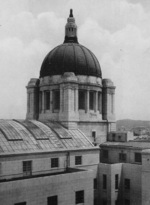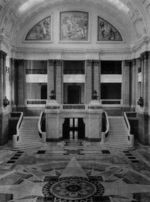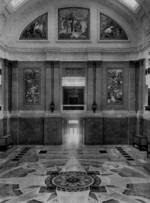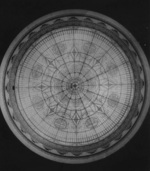Keijo General Government Building
| Type | 97 Government Building | |
| Historical Name of Location | Keijo, Korea | |
| Coordinates | 37.576411001, 126.976836920 |
Contributor: C. Peter Chen
ww2dbaseThe Japanese Governor General ruled Korea from the General Government Building in Keijo (Keijo is read in Korean as Gyeongseong; the city is now known as Seoul) from 1926 until the end of the end of the occupation, which corresponded with the end of WW2. The construction was planned as early as 1911, one year after the start of the occupation. Japan deliberately chose the site of the historical Gyeongbokgung palace, demolishing most of the buildings, with ten buildings surviving thanks to influential Japanese philosopher Soetsu Yanagi. The building of Neoclassical style was designed by German architect Georg De Lalande, who had been a resident of Japan since 1901. De Lalande passed away in 1914, and Japanese architect Ichiro Nomura succeeded him. The construction was originally planned to take 3 years at the cost of 3,000,000 Yen, but it would ultimately take over 9 years and 6,750,000 Yen to complete. From Makoto Saito to Nobuyuki Abe, a total of eight Governor Generals oversaw civilian matters and very limited military matters from offices in this building. On 9 Sep 1945, Americans Vice Admiral Thomas Kinkaid and Lieutenant General John Hodge received the surrender of all Japanese forces in Korea in the Keijo General Government Building. After the war, the building served as the home of the National Assembly of the Republic of Korea until 1975 when the present national assembly building was completed. In 1986, it became the National Museum of Korea. In 1991, Minister of Culture Lee O-young (Yi Eolyeong) started exploring the possibility of removing the General Government Building. In Aug 1993, newly inaugurated President Kim Young-sam announced his support for the removal, listing the removal of symbol of Japanese imperialism and making space for the reconstruction of Gyeongbokgung as the primary reasons. After a period of great national debate, the building was demolished between 1995 and 1996. As of 1998, the dome and several other pieces from the building are now on display on the grounds of the Independence Hall museum in Cheonan, Korea.
ww2dbaseSource: Wikipedia
Last Major Update: May 2014
Keijo General Government Building Interactive Map
Photographs
 |  |  |  |
Keijo General Government Building Timeline
| 25 Jun 1916 | A Shinto ceremony was held at the site of the future General Government Building in Keijo (now Seoul), Korea to bless the construction work. |
| 10 Jul 1916 | The construction for the General Government Building in Keijo (now Seoul), Korea began. |
| 10 Jul 1920 | Japanese Governor General of Korea Makoto Saito lead a ceremony at the General Government Building in Keijo (now Seoul) construction site, during which an engraved tablet was installed. |
| 17 May 1923 | The sign of the General Government Building in Keijo (now Seoul), Korea was hung on the building during a ceremony. |
| 4 Jan 1926 | The construction of the General Government Building in Keijo (now Seoul), Korea was completed. |
| 1 Oct 1926 | The General Government Building in Keijo (now Seoul), Korea was officially inaugurated. |
| 9 Sep 1945 | Americans Vice Admiral Thomas Kinkaid and Lieutenant General John Hodge accepted the surrender of all Japanese forces in Korea in the General Government Building in Seoul, Korea. Unaware of previous Japanese-Korean agreements on the transfer of power, Hodge ordered the Japanese occupation administration to remain in place, triggering anger among Koreans. Realizing the mistake made in his ignorance, Hodge quickly rescinded his order. However, he refused to recognize any of the political organizations vying for power in Korea, solely relying on his own military administration to make decisions despite of his staff's less than perfect understanding of the political situation. |
| 24 Jul 1948 | Rhee Syngman was sworn in as the President of the Republic of Korea at the General Government Building in Seoul, Korea. |
| 29 Sep 1950 | A ceremony was held at the the General Government Building in Seoul, Korea to celebrate the recapture of the city by the forces of the United Nations. |
| 21 Aug 1986 | The General Government Building in Seoul, Korea became the home of the National Museum of Korea. |
| 15 Aug 1995 | The demolition work on the General Government Building in Seoul, Korea began. The dome was the first structure to be removed. |
| 13 Nov 1996 | The demolition work on the General Government Building in Seoul, Korea was completed. |
| 8 Aug 1998 | The top of the dome of the former General Government Building of Seoul, Korea, as well as other pieces of the demolished building, went on display on the grounds of the Independence Hall museum in Cheonan, Korea. |
Did you enjoy this article or find this article helpful? If so, please consider supporting us on Patreon. Even $1 per month will go a long way! Thank you. Share this article with your friends: Stay updated with WW2DB: |
| WW2-Era Place Name | Keijo, Korea |
| Lat/Long | 37.5764, 126.9768 |
 |
- » 1,150 biographies
- » 337 events
- » 44,024 timeline entries
- » 1,241 ships
- » 350 aircraft models
- » 207 vehicle models
- » 375 weapon models
- » 123 historical documents
- » 260 facilities
- » 470 book reviews
- » 28,586 photos
- » 432 maps
Captain Henry P. Jim Crowe, Guadalcanal, 13 Jan 1943
Please consider supporting us on Patreon. Even $1 a month will go a long way. Thank you!
Or, please support us by purchasing some WW2DB merchandise at TeeSpring, Thank you!